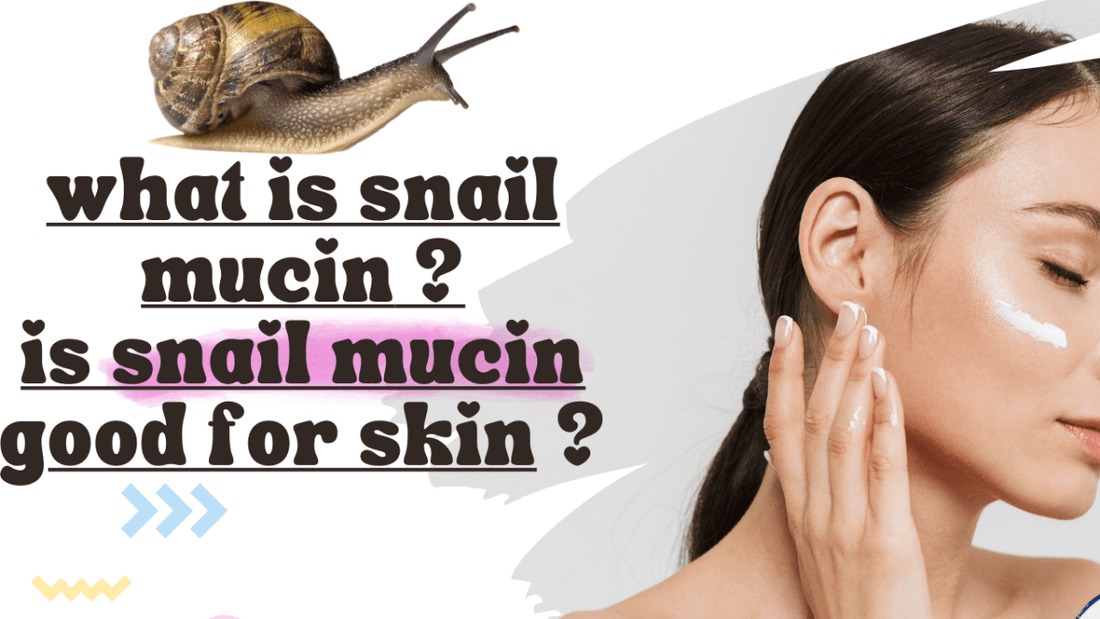What is Snail Mucin? A Comprehensive Guide to the Buzzy Skincare Ingredient

Snail mucin, also known as snail slime, has gained significant attention in the skincare world. Despite its initial ick factor, snail mucin is proving to be an effective ingredient with several benefits for the skin. In this comprehensive guide, we will delve into the science behind snail mucin, its main benefits, who should use it, how to use it, and potential side effects. Let's uncover the secrets of this buzzy skincare ingredient.
The Science Behind Snail Mucin
Snail mucin, also referred to as snail secretion filtrate (SSF), is a natural secretion produced by snails to protect themselves. When snails are under stress, they excrete this mucin as a defense mechanism. Snail mucin is rich in various ingredients that promote skin healing and regeneration. It is highly regarded in the K-beauty world for its noticeable results.
The Benefits of Snail Mucin for Skin
Snail mucin offers a multitude of benefits for the skin. Let's explore the main advantages:
1. Moisturizes the Skin
Snail mucin contains moisturizing agents that repair the skin's barrier function. By locking in moisture and preventing irritants from entering, snail mucin keeps the skin hydrated and nourished. This makes it an excellent choice for individuals with dry skin.
2. Stimulates Collagen Production
Collagen is the protein responsible for maintaining the skin's strength and youthfulness. Snail mucin, being a stress-induced excretion, contains growth factors that trigger the growth of new skin cells and collagen. The presence of glycolic acid in snail mucin further enhances its collagen-boosting properties.
3. Soothes Irritation
Snail mucin contains allantoin, a key component with healing properties. Allantoin calms irritation, smooths the skin, and stimulates cell regeneration. This makes snail mucin beneficial for individuals with sensitive or irritated skin.
4. Delivers Essential Vitamins and Minerals
Snail mucin is packed with skin-nourishing nutrients, including anti-inflammatory zinc, healing manganese, copper peptides, and vitamins A and E. These antioxidants contribute to overall skin health and protection against environmental damage.
Who Should Use Snail Mucin?
Snail mucin can be used by individuals of all skin types, although it is particularly beneficial for those with dry or sensitive skin. The hydrating and soothing properties of snail mucin make it an excellent choice for individuals looking to improve their skin's moisture levels and reduce irritation.
It is important to note that snail mucin is derived from animals, so it may not be suitable for vegans or individuals who prefer to avoid animal-derived ingredients in their skincare routine.
How to Use Snail Mucin
The frequency of snail mucin usage depends on the specific product and desired benefits. Here are some general guidelines:
1. Moisturizing Purposes
For moisturizing purposes, opt for a night cream that contains snail mucin. Apply it every evening on clean skin as the final step in your skincare routine. You can layer it over toners or serums for enhanced hydration and regeneration.
2. Multi-Purpose Anti-Aging
If you're using snail mucin for its anti-aging benefits, look for a serum with a higher concentration of the ingredient. Apply it morning and night after cleansing, before any other skincare products. This allows the snail mucin to penetrate deeply and deliver its collagen-stimulating and skin-smoothing effects.
Potential Side Effects of Snail Mucin
Snail mucin is generally well-tolerated by most individuals, with no well-documented side effects. However, as with any skincare product, there is a possibility of allergic reactions. It is advisable to perform a patch test on a small area of skin, such as the inside of your forearm, before incorporating snail mucin into your regular skincare routine. If you experience any adverse reactions, discontinue use and consult a dermatologist.
The History of Snail Mucin in Skincare
The use of snail mucin in skincare is not a recent trend. In ancient Greece, the famous doctor Hippocrates wrote about the potential benefits of snail mucus. By the 19th century, snail mucin was considered a remedy for various skin issues and was believed to promote smooth skin. However, it is essential to distinguish between the benefits of consuming cooked snails and using snail mucin in skincare products.
Snail Mucin: Fact or Fiction?
While some studies suggest that snail mucin has hydrating and collagen-stimulating properties, more research is needed to establish its efficacy in skincare. The scientific community has yet to reach a consensus on the true benefits of snail mucin. It is always wise to consult with a dermatologist before incorporating any new skincare ingredient into your routine.
Conclusion
Snail mucin, with its moisturizing, collagen-stimulating, and soothing properties, has captured the attention of skincare enthusiasts. Although more research is needed to fully understand its benefits, many individuals have reported positive results from using snail mucin products. However, it is essential to consider individual skin sensitivities and consult with a dermatologist before adding snail mucin to your skincare routine. Embrace the potential benefits of this buzzy skincare ingredient, and let your skin decide if snail mucin is worth exploring.

